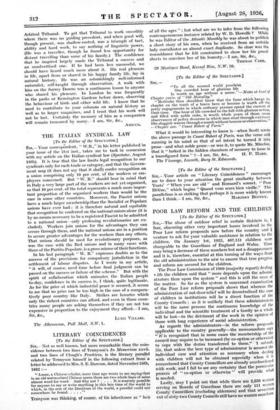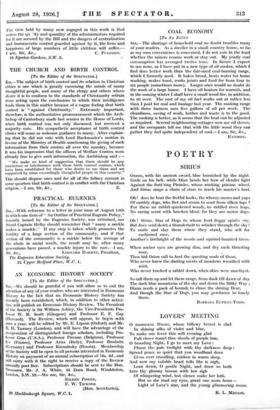POOR LAW REFORM AND THE CHILDREN
[To the Editor of the SeEcT.vrott.] Su:,--The abuse of outdoor relief in certain districts is, I fear, obscuring other very important issues involved in- 1.11(: Poor Law reform proposals now before the country and venture to ask for your valuable assistance in relation to the children. On January 1st, 1925, 467,151 children were chargeable to the Guardians of England and Wales. Time may bring a decrease of these numbers but not a disappearance and it is, therefore, essential at this turning Of the ways froth the old administration to the new to ensure that true progress and reform are secured for the children.
The Poor Law Commission of 1909 (majority report) dealing ith the children said that "more depends upon the admini- strators than upon the system " and this is still the crux of the matter. So far as the system is concerned examination of the Poor Law reform proposala showS that whereas the administration of out-door relief will be decentralized the care of children in institutions will be a direct function of the County Councils ; as it is unlikely that these administrators will be the same persons the continuous knowledge of the individual and the scientific treatment of a family as a whole will be lost—to the detriment of the work in the opinion of those • with long experience of- social administration.
As regards the adMinistrators—in the reform proposals applicable to the country generally—the memorandum says " if is recognized that in some cases the membership of the council may require to be increased (by co-option or otherwise) to Cope with the duties transferred to them." I submit, Sir, that unleSs the best type of administrator is secured the individual care and attention so necessary when dealing with children will not be obtained especially when it is remembered that County Councillors are already overburdened with work, and I fail to see any certainty that the permissive process of " co-option or otherwise " will provide what is needed.
Lastly, may I point out that while there are 2,830 women serving on Boards of Guardians there are only 111 women County Councillors .(excluding aldermen) and that seventeen out of sixty-two County Councils Still have no women membent The view held by many now engaged in this work is that unless the qu -ity and quantity of the administrators required for it are secured by the Bill and the dangers of centralization and bureaucratic control guarded against by it, the lives and happiness of large numbers of little children will suffer.— I am, Sir, &c., C. Fr roan. 16 Egerton Gardens, S.W. 3.







































 Previous page
Previous page